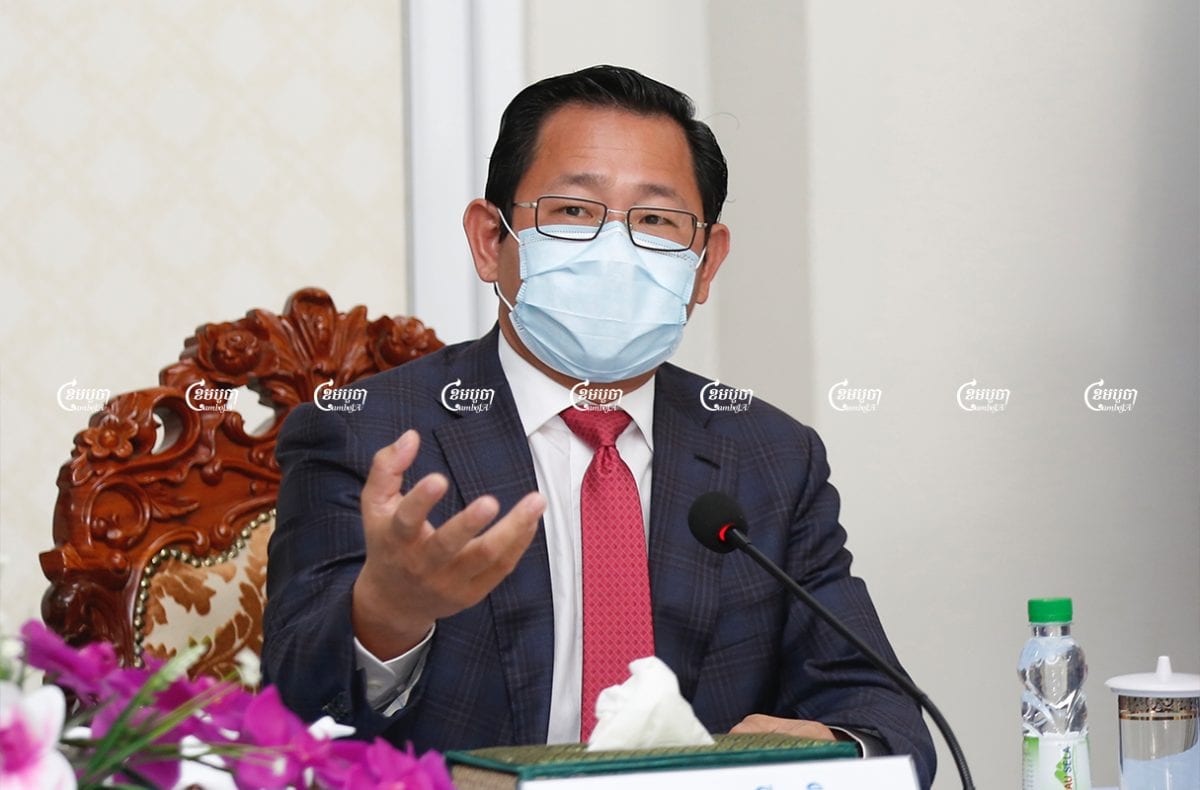Cambodia’s justice minister has again urged judges and prosecutors to crack down on corruption in the nation’s judicial system, declaring that the fight against corruption was a key part of a now-year-long campaign to clear the backlog of cases in Cambodia’s courts. But longtime advocates for legal reform are calling for concrete action to follow the minister’s commitment.
“[Officials] at all levels must strengthen their capacity in line with the progress of the reforms, and must participate in promoting honor, dignity and professional ethics,” justice minister Koeut Rith said on Monday.
The minister made the call at a ceremony marking the appointment and transfer of duties of seven provincial prosecutors and judges, who are reshuffled every four years. According to a royal decree signed on 13 May, 47 judges and prosecutors nationwide have been reshuffled this year.
“The appointment and transfer of the duties of judges and prosecutors is common in the judicial profession to ensure a better and more efficient promotion of the provision of justice with impartiality, fairness, and justice,” he said.
Seng Sivutha, who has just been appointed as president of the Phnom Penh appeal court, has pledged to promote justice and reduce corruption.
“We will implement all measures to promote the just provision of services and speed up the hearing process thoroughly and effectively, as well as reducing any form of corrupt acts by bringing the service closer to the people,” he said.
Sivutha said that the opening of appeal courts in Tbong Khmum, Battambang and Preah Sihanouk provinces had substantially reduced the number of unresolved cases.
“We have cleared many cases,” he said. “And now I am urging [judges and prosecutors] to thoroughly hear cases, especially those concerning drug and human trafficking — and from July to December, the backlog cases will be hugely decreased.”
Cambodia’s judicial system has been accused of being corrupt and frequently following the ruling party’s demands. According to the former UN special rapporteur on Cambodia, more than a third of the nation’s prison population is in pre-trial detention, though some rights groups put that figure closer to 75 percent.
Am Sam Ath, deputy director of monitoring at rights group Licadho, said that the backlog of cases is part of a broader prison congestion problem due to widely used provisional detention. Although there are legal limits to the length of time someone can be held without a trial, those limits are frequently ignored, with many of those arrested remaining behind bars for years without a trial — particularly political activists.
“The unsolved cases greatly affect the justice process,” he said. “Because when the cases remain unsolved, it affects the finding of justice for the people, and they may lose confidence in the judicial system.”
Prum Chantha, a wife of former CNRP activist Kak Komphea, said that her husband has been in detention without trial for one year now. Komphea was arrested on charges of conspiracy and incitement related to the treason case against senior opposition leader Kem Sokha.
Despite the minister’s commitment, Chantha does not believe the judicial system will be reformed.
“I think it is unfair for my family, who are political activists,” she said. “My husband has been held without trial for one year since he was arrested in May 2020. They [the court] normally release drug criminals on bail … I demand the unconditional release of my husband.
Sam Ath said that the whole judicial system must be reformed to ensure that judges could make their own independent decisions based on legal and professional ethics.
“We observe that land dispute cases are quickly resolved when they are related to powerful or wealthy people, but not for ordinary people,” he said. “Therefore, the implementation of [legal] procedures must be equal to avoid corruption, as raised by the minister.”
Justice Ministry spokesman Chin Malin denied that the country’s judicial system came under political influence.
“[NGOs] do not understand the legal procedures,” he said. “They are looking at the cases by person and not by court procedure, and they consider it fair or unfair based on whether those people are activists, politicians, rich or poor — they just look at the pictures, not the facts.”
According to figures released by the Ministry of Justice in August 2020 to mark the first hundred days of its campaign, more than 8,000 criminal cases, or 63 percent of the reported legal backlog, had been cleared. Malin said that the full figures covering the year-long campaign, which were initially planned to be published on May 17, are still unavailable due to COVID-19. Due to the pandemic, he said, some cases had been suspended, though he maintained that other important cases were still being processed.
Transparency International Cambodia executive director Pech Pisey said that while he supported the minister’s commitment, he encouraged him to take concrete actions, saying that citizens will be watching very closely.
“Tackling judicial corruption must take the center stage if the government wants to address social dissatisfactions and injustice, which is on the rise in Cambodia,” he said.
He said that Cambodia’s social and economic development should be founded based on the rule of law, a corruption free-government and a reliable judiciary that can deliver justice.
“By eliminating corruption and enhancing judicial independence, Cambodia can attract investment, increase employment and reduce inequality,” Pisey said.
According to Transparency International Cambodia’s 2020 corruption perception index, the nation received a score of 21 out of a total 100 — an improvement of one point since 2018. The report placed the country at number 160 in the global ranking among 180 countries and territories.








